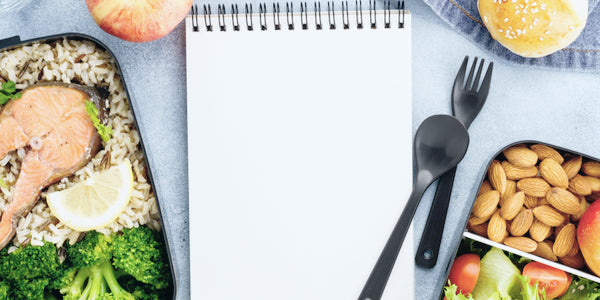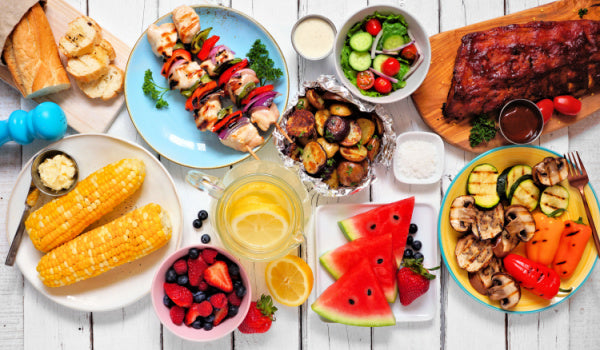
Weight loss occurs when calories in are less than calories out. Based on quantitative numbers, there needs to be a 3,500 calorie deficit to lose one pound.
So to lose one pound a week, a 500 calorie deficit daily needs to take place. This mostly occurs by restricting calories and/or increasing physical activity.
Weight loss in terms of basic math seems simple, right? If only…
Losing weight is more than just a mathematical equation of cutting calories and amplifying workouts. These 10 common, yet unexpected reasons can help answer the frustrating question, "Why am I not losing weight?"
Find out reasons why you keep failing with weight loss and how to stick to a diet once and for all!
10 Common Diet Fails
If you find yourself "winging it" or falling into the "health halo," you may be falling short of weight loss goals.
Diet Fail #1: You treat your diet as a one-time stint.
Treating a diet as a one-time stint, instead of a lifelong pursuit, mostly leads to re-gaining weight. Some people even gain more weight than what they started with at the beginning of their diet.
The goal of a diet is not to deprive yourself for short-term results. It is, however, to develop a pattern of healthy eating with weight loss followed by weight maintenance.
Diet Fail #2: You just "wing" your diet and weight loss plan.
"Going on a diet" is a fairly loose statement without much structure. Lacking organization can be detrimental to short and long-term success.
"Winging" it truly makes it that much easier to resort to temptations and skip out on a workout.
Diet Fail #3: You fall into the "health halo."
The "health halo" effect is when one attributes a food item as "healthy," which can lead to overeating on that item. This often occurs from marketed diet claims, including "sugar-free" and "low-calorie."
For instance, a product labeled "sugar-free" could also still be high in fat and calories. Choosing a salad over a combo meal at a fast food restaurant is another example of the "health halo."
A salad stocked with leafy greens and other veggies seems like a healthy lunch. However, dousing it with dressing, cheese, and croutons can tack on hundreds of calories.
Diet Fail #4: You restrict a variety of foods.
People often restrict certain foods and food groups on a diet, especially in hopes to achieve a negative calorie balance. However, too much restriction can be detrimental to losing weight.
Taking cake each time is offered is not ideal, though having cake and eating it too is just fine on occasion. Depriving yourself of the foods you love is unnecessary to still lose weight.
Besides, giving your body what it truly wants can decrease the risk of a binge later on. What is important, just like all foods, is paying attention to portion and serving sizes.
Diet Fail #5: You do not balance protein, fiber, and healthy fat in the diet.
Running and giving into cravings all too often on your diet? This may not be a product of lack of willpower, but rather a real response to hunger.
Protein, fiber, and healthy fat are all important nutrients for weight loss. And balancing them in a healthy diet helps keep hunger, energy, and blood sugar at bay.
Diet Fail #6: You forget to stay hydrated.
Staying hydrated has a vital role for weight loss and increase metabolism. In fact, even slight dehydration can slow down metabolic processes.
Drinking water before and with meals can likewise improve digestion and induce satiety.
Diet Fail #7: You become monotonous in a workout routine.
While diet is the key factor for weight loss, exercise plays a role in managing weight and improving overall health. And any exercise is better than going without, though staying stagnant in a routine can prevent the body from reaching its maximum potential.
To shake things up, give other workouts a try. For example, high-intensity interval training (HIIT) can accelerate and burn calories even after the workout is complete. Adding resistance straining to strengthen muscles can allow the body to burn additional calories even at rest.
Diet Fail #8: You let stress get the best of you.
Stress bombards into our lives whether it is welcomed or not. Not only can stress interfere with quality of life, it has the potential to disrupt weight loss.
In response to stress, the body releases the stress hormone known as cortisol. As a consequence, an increase in appetite or fat deposition in the abdominal region may occur.
To make matters more challenging, psychological responses to stress can also increase emotional eating and lead to bingeing episodes. Unfortunately, the foods craved and sought out during these bouts tend to be rich in sugar, fat, and overall calories.
Diet Fail #9: You do not get enough sleep each night.
The quality and quantity of sleep plays a role in losing weight. What's more, a lack of sleep can lead to weight gain.
Some explanations include less hours equals less energy for activity throughout the day and more time to eat. Inadequate sleep can also heighten cravings and alter hunger hormones.
Diet Fail #10: You make too many changes all at once.
Just like at New Year's, people who make resolutions at one typically fall off the bandwagon within a few weeks.
Sure, it is great you plan to workout and cook at home five times a week while keeping a steady job. And not to mention, all the New Year's resolutions about saving money and spending more time with loved ones.
Overexcitement can lead to a feeling of being overwhelmed. Too many new habits at once can be a recipe for failure.
How to Stop Failing at Weight Loss and Dieting
You may be surprised to find out "failing" is not necessarily all about "cheating" on a diet.
Really, one should stop cheating and undermining the need for a comprehensive lifestyle change. This should be complete with realistic goals and a structured plan, along with an optimistic yet determined mindset.
1. Commit to a Healthy Lifestyle Change
Time and time again, dieters wonder "Why do I regain weight?" after stopping their diet. This is because dieters often have a particular goal weight in mind and once met, resort to old and unhealthy habits.
So instead of sticking to a short-lived diet, commit to a lifestyle change for the long haul. As previously explained, this involves factors beyond diet and includes regular exercise, adequate sleep, and stress management.
2. Make a Plan
While it is nearly impossible to plan out every detail in life, creating structure can make the world of difference. So instead of "winging it," make a plan with structured and actionable goals.
For instance, instead of saying you will "eat healthy," identify how you will do so. This may include the practice of meal prep for sticking to a diet and "not cheat" throughout a busy week. Keeping healthy snacks and meals on hand likewise lowers the risk of falling into temptation.
A Registered Dietitian, personal trainer, and other health professionals can assist in this process.
3. Be Realistic
If throwing in the towel based on frustration, more than likely the problem is not the effort, but the goal. And while it is admirable to be ambitious, be realistic with weight loss or other goals.
Really, realistic weight loss goals include losing 1 to 2-pounds per week. However, these numbers can ebb and flow based on other factors that impact weight loss such as gender and age.
4. Take It One Day At a Time
To avoid making too many changes at once, start with something you can confidently do almost every day for a month. Some simple, small changes to make may include:
• Trying one new fruit or veggie each week.
• Getting 10,000 steps each day.
• Drinking more water.
• Replace the candy jar with a few squares of dark chocolate.
Realize nobody is perfect as well, and if it means eating two extra veggies each day, that is a great place to start. Because each time you do complete a goal, you will feel that sense of accomplishment. And once you meet these goals, you automatically feel empowered to achieve the next one.
Also recognize that "cheating on your diet" is not failure and allow yourself to enjoy those so-called "unhealthy foods." Life is too short to not enjoy that slice of birthday cake or scoop of ice cream on a summer day!
The utmost importance is making small changes that lead to lasting healthy habits!







